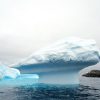
MOSCOW, June 26. Even a slight increase in ocean temperatures could lead to a dramatic acceleration in the melting of glaciers in Antarctica, write British scientists Alexander Bradley and Iain Hewitt in an article for the scientific journal Nature Geoscience.
“We found that rising ocean temperatures could lead to to a turning point, after which ocean water will penetrate to an unlimited extent under the ice sheet (of Antarctica — editor's note) due to uncontrollable melting,» the publication says.
Scientists explain that warming seawater, which gradually melts the glacier and penetrates under the shield, will sooner or later lead to very rapid flooding of voids in the ice and a sharp increase in the melting rate. But it is extremely difficult to predict the onset of such a “tipping point” for the glacier, they note.
“
"Our results indicate a greater sensitivity of the melting process of the ice sheet (to rising ocean temperatures. — Ed.) and “, accordingly, to a greater contribution of climate warming to sea level rise,” experts write.
As climatologist Alexey Kokorin said, the rise in sea level in the 22nd century could reach five meters — this will happen under the worst-case scenario, under the influence of all factors, including human influence and thermal expansion of water.
UN Secretary-General Antonio Guterres previously stated that the Earth's temperature could rise by 2.8 degrees by the end of the century if countries do not radicalize their decarbonization strategies. The key agreement in this area is the 2015 Paris Climate Agreement, which envisages measures to limit global temperature growth to 1.5 degrees Celsius, with a maximum of 2 degrees by 2100.
As part of the global climate agenda, most countries have adopted programs to achieve carbon neutrality, that is, a balance between anthropogenic emissions of greenhouse gases (carbon dioxide, methane, and others) and their absorption both through technological solutions (renewable energy sources, transport electrification, CCUS in industry, hydrogen) and through natural ecosystems (primarily forests). Russia plans to achieve carbon neutrality by 2060.























































Свежие комментарии